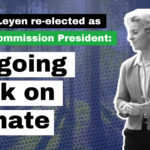European Commission misses opportunity to put in place a ratchet-up mechanism and to set an ambitious starting point for reductions.
EU countries’ climate targets, included in the proposal for the Effort Sharing Regulation published by the European Commission today are too weak to prevent devastating climate change in line with the objectives of the Paris Agreement.
According to Climate Action Network (CAN) Europe, the Commission missed an important opportunity to scale up EU climate action in today’s proposal by failing to introduce a ratchet-up mechanism to increase targets over time and by refusing to set the lowest starting point for emission reductions in 2021.
The Effort Sharing Regulation proposal presented by the European Commission today outlines how to break down the EU-wide target to reduce emissions from transport, buildings and farming by 30% by 2030 into national targets for the 28 Member States. Climate Action Network (CAN) Europe argues that the bloc-wide pledge is outdated, as it was defined by the EU Heads of State and Government more than a year before the Paris Summit, and it is not aligned with the objectives to limit temperature rise well below 2°C, let alone 1.5°C enshrined in the Paris Agreement.
The proposal aims to put into effect a pledge that is out of line with the Paris Agreement – Wendel Trio, Director of CAN Europe said. Each EU country will have to scale up its efforts to keep the Paris Agreement goals within reach and avoid runaway climate change. For each EU country an increase of efforts would open up opportunities for green growth, better public transport, cleaner air and water, less energy poverty and more jobs.
While the European Commission was not entitled to propose a higher target, it could have devised other means to scale up EU’s insufficient climate action. However, it missed an opportunity to establish a ratchet-up mechanism that would allow to update the legislation automatically when the EU’s target is increased.
The proposal lacks a crucial element that would allow to automatically strengthen inadequate national targets when the overall EU commitment is revised. After all the rhetoric on the need to increase ambition through regular reviews that the EU pushed for in Paris, failing to include a review mechanism in our own laws sends a wrong signal abroad – Trio added.
Moreover, for the total amount of carbon each country will be allowed to emit after 2020, the starting point for calculating reductions is as important as the target. The Commission opted for starting at the average emission levels in 2016-2018. Compared with the Commission’s proposal, a more ambitious approach that would put the starting level closer to where emissions will actually be in 2021, would further reduce the EU’s emissions by at least 850 million tonnes.
The Commission missed an opportunity to substantially boost emission cuts by setting the starting point for reductions as ambitiously as possible. Opting for a more ambitious approach would cut greenhouse gases more than the 2014 emissions of Germany and France combined, having a great positive impact for the climate – Trio concluded.
ENDS
Contact:
Ania Drazkiewicz, CAN Europe Communications Coordinator, ania@caneurope.org, +32 494 525 738
Wendel Trio, CAN Europe Director, wendel@caneurope.org, +32 473 170 887
Anja Kollmuss, CAN Europe Climate policy coordinator, anja@caneurope.org, + 41 774 853 667
Notes:
European Commission, Proposal for a REGULATION OF THE EUROPEAN PARLIAMENT AND OF THE COUNCIL on binding annual greenhouse gas emission reductions by Member States from 2021 to 2030 for a resilient Energy Union and to meet commitments under the Paris Agreement: http://ec.europa.eu/transparency/regdoc/rep/1/2016/EN/1-2016-482-EN-F1-1.PDF
Annexes with national targets:
http://ec.europa.eu/transparency/regdoc/rep/1/2016/EN/1-2016-482-EN-F1-1-ANNEX-1.PDF
CAN Europe briefings from July 2016:


